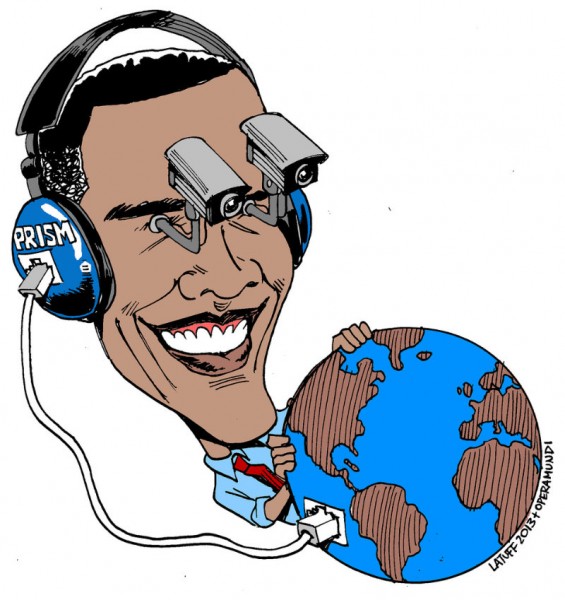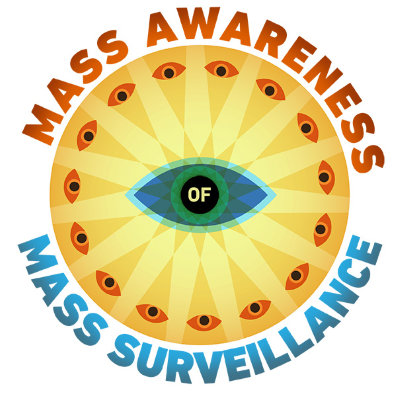
Pirate Party demonstrators in Berlin, 2013. Photo by Mike Herbst via Wikimedia Commons (CC BY-SA 2.0)
You don't have to be an Internet user in China, Cuba or Iran to be worried about your government watching your every digital move, because the US has been spying on almost everyone, everywhere since 2007.
June 5 marked the first anniversary that this generation's most famous whistleblower Edward Snowden, a former CIA employee and NSA contractor, lifted the curtain on a massive global spying machine – America's National Security Agency (NSA). Our coverage of the anniversary focuses on how far we have come to understand the issues relating the mass-surveillance and what we need to do to protect our individual security and privacy.
Anniversary Coverage:
05 Jun Governments Around the World Urged to End Mass Surveillance
05 Jun How the NSA Violates International Human Rights Standards
05 Jun The World After Snowden, as Seen from Colombia
03 Jun Get the Facts: 365 Days of Snowden Leaks
29 May 365 Days of Snowden: This June 5, Say No to Surveillance
[Protect yourself by signing up for #ResetTheNet's Privacy Packet here.]
Read Wikimedia's round up of global events demanding action against mass surveillance here.
Trending on Twitter:
#StopSpying | #ThanksSnowden | #ResetTheNet
Backstory
Snowden first leaked official top-secret PowerPoint slides, as an anonymous whistleblower, to newspapers the Guardian and the Washington Post, proving that the NSA has been covertly collecting user data from major Internet companies like Google, Facebook, Skype, and Apple, under a program called PRISM. On June 9, 2013 he revealed his identity, in this video.
The leaks confirm previous allegations made by US civil liberties advocates. The Guardian published the first leak in an exclusive report on June 6, detailing a top secret court order compelling American telecom company Verizon to hand over information on millions of its customers, such as call time, duration, and location. Within hours, the Guardian and the Washington Post revealed the existence of the PRISM program, which provides the NSA with direct access to servers of Internet companies, which could given them your private data such as email, chat, videos, and photos without you even knowing.

Cartoon by Carlos Latuff, shared via Web We Want/Flickr (CC BY-SA 2.0)
While the White House administration tacitly acknowledged and defended the program, Internet companies have angrily denied that they had given the NSA “direct” or “unfettered” access to their servers. CNet and the New York Times reported that major Internet companies have systems that “involve access to data under individual [Foreign Intelligence Surveillance Act] FISA requests. And in some cases, the data is transmitted to the government electronically, using a company’s servers.”
Reports indicate that the NSA applies a vague standard of “foreignness” when determining whether or not a person's communications would be subject to surveillance under US laws, specifically the FISA and Section 215 of the Patriot Act. So a FISA order might “target” a suspected terrorist, but also request access to the private data of all of the target’s associates — some of whom might happen to live in the United States. In practice, anyone in contact with individuals in other countries, whether they were hatching terrorist plots or just catching up on family gossip— could come under watch. On June 14, US federal prosecutors charged Snowden with espionage and theft of government property. He is currently in the process of seeking asylum from US prosecution. Our latest coverage has shadowed him and rumors of his movement from Hong Kong, Russia, to mid-air with Bolivia's President Evo Morales.
2013 Coverage
15 Aug From North to South, the Government is Watching You (Advox)
6 Aug Russians Wary of Snowden Asylum
17 July Puerto Rico is a Key Link in Espionage of Latin American Countries
16 July The Perils of Putting a Label on Edward Snowden
15 July Snowden Airport Saga Polarizes Russian Human Rights Community
15 July Snowden, the NSA, and Latin America: Beyond the Headlines
15 July Puerto Rico a Hub for Spying on Latin America
9 July Venezuela's President Offers Asylum to Edward Snowden
8 July Why Would Edward Snowden Want to Go to Ecuador? (Advox)
4 July Snowden Air Search: “Be Strong” Morales, Latin American Presidents Tweet
4 July How Edward Snowden Divides Russians
27 June Snowden Asylum, the US and Latin America (Quick Read)
26 June US Got Snowden's Name Wrong on Extradition Papers, Hong Kong Says
26 June Caribbean: Snowden Raising Spectre of “Monster Under Bed”?
25 June Netizen Report: Turkey to Increase Social Media Restrictions? (Advox)
23 June Outrage in the European Union over United States Espionage Program
19 June China Shoots Down Accusations that Edward Snowden is a Spy
19 June Netizen Report: The World Reacts to PRISM (Advox)
18 June Caribbean: Is Somebody Watching?
18 June Support Snowden Rally in Hong Kong (Quick Read)
18 June VIDEO: Experts Speak on Role of Whistleblowers (Advox)
14 June Everyone's Rights are at Stake: Global Reach of US Surveillance Programs (Advox)
13 June China Quotes Foreign Press on Snowden (Quick Read)
12 June PRISM Infects Russia with Cyberwar Scare
11 June Snowden Hides in Hong Kong, US-China Diplomacy Takes Center Stage
11 June US Spying Whistleblower Edward Snowden Takes Refuge in Hong Kong (Advox)
11 June Netizen Report: US Internet Spying Program Revealed (Advox)
Resources
- The NSA Files - the Guardian's full coverage of PRISM leaks
- Here’s everything we know about PRISM to dateThe Washington Post's Wonkblog explains the ins and outs of the US Surveillance program
- Code name ‘Verax’- The Washington Post Reporter reveals his interactions with Snowden, in the weeks leading to the leaks
- The Wired report on Snowden's complete 41-page powerpoint, which both the Guardian and the Post refused to publish in its entirety
- Snowden Profileon BBC.com
- Prism and privacy: What could they know about me? - BBC.com explainer
- Reform the Patriot Act: Section 215 – An American Civil Liberties Union explainer
- Wiki page on Edward Snowden
- Wiki page on PRISM
- Best Bits open letter to the UN Human Rights Council requesting a special session on PRISM
Please contact Global Voices Managing Editor Sahar Habib Ghazi or Advocacy Editor Ellery Biddle, if you have links, story ideas, or want to add to this page's resource list.
What we do: Global Voices bloggers report on how citizens use the Internet and social media to make their voices heard, often translating from 30 different languages. Global Voices Advox seeks to build a global anti-censorship network of bloggers and online activists throughout the developing world dedicated to protecting freedom of expression and free access to information online.

